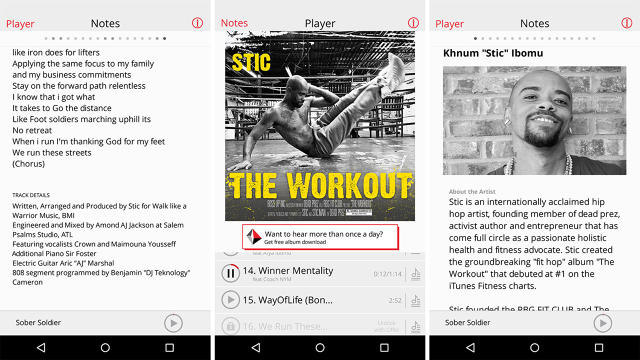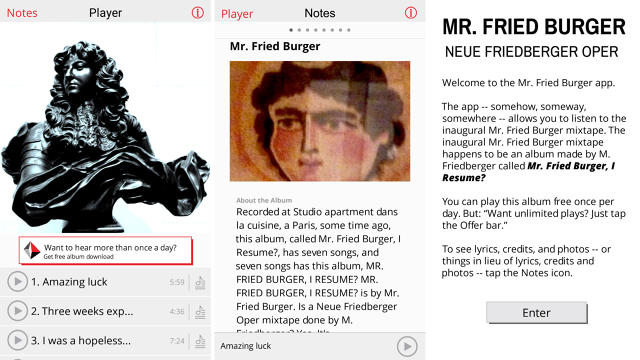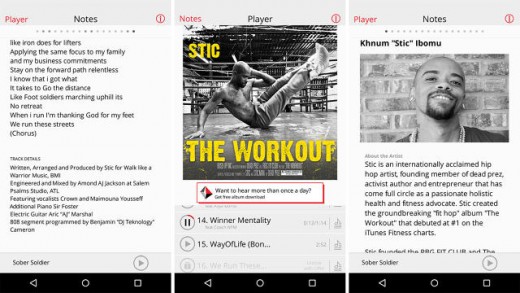Ex-Google Play Exec Launches A Music-Streaming Platform Powered By Mobile Gaming Lessons
On Tim Quirk’s Freeform, albums are apps designed to engage listeners with free content and convert them to paying fans. How’s that sound?
In the four years that Tim Quirk was global head of programming at Google Play, he was responsible for merchandising all of the platform’s digital content. This work took Quirk far beyond the music industry he knew well as a former Rhapsody exec and frontman of ’90s alt-rock everydudes Too Much Joy.
“Part of my job had me sitting in quarterly business reviews with not just the labels that I had been working with forever, but book and magazine publishers, movie and TV studios, and mobile game developers,” says Quirk. “I realized really quickly that the mobile-game developers were just light years beyond everyone else in the entertainment sector.”
The difference, he says, was the degree to which mobile gaming understood digital distribution and its own ecosystem. For example, whenever Google Play would start the approximately seven-week rollout of a platform change, “invariably, in the first 24 to 48 hours, more than one of our major game developers would call us up. They couldn’t see what had changed, but they would see a spike or a dip somewhere in their Android installs, conversions, or whatever. They’d know something fundamental had changed in their ecosystem, and they wanted to understand it. I’ve never seen the music business operate that way.” Moreover, the mobile-gaming business was exploding as the record business was pretty much screwed.
In 2013, Quirk began to explore the ways that lessons from mobile gaming could be applied to music distribution. Last year he left Google and partnered with former Sound Exchange exec and music manager Bryan Calhoun to found Freeform, a music-distribution platform that launched Thursday night with six artist apps. It’s designed to share and monetize music using the principles of mobile gaming: make engaging content available for free to as many people as possible, and convert a small but important percentage into paying fans, or perhaps customers of paying partners.
Freeform isn’t at the moment a direct competitor to streaming services like Spotify or Apple’s just-revealed Music, nor is it an alternative store to iTunes or Google Play. In fact, it can send interested buyers to those services, and has a critical partnership with Rhapsody. What it does do is allow artists to build a free app that for now includes an album with one free play of all tracks per day, lyrics, production credits and other info, photos, videos if the artist has them, and the ability to unlock unlimited streaming and a free mp3 download by redeeming any partner offer.

With Freeform, then, artists directly control their content and customer information. Unlike catalog-driven services that can only compete by securing licenses for millions of songs, Freeform is launching with albums from only six artists who have signed on early to test the concept: Rob Thomas of Matchbox Twenty, Matthew Friedberger from The Fiery Furnaces, Stic from hip-hop legends Dead Prez, L.A. soul group The Rebirth, Alternative-folk favorite Melissa Ferrick, and Too Much Joy side project Wonderlick.
“We are not game-ifying music,” says Quirk. “We’re just seeing which of these lessons can apply to the music space. People are willing to spend money, just not in a way that the music business has adapted to. The general idea here is ‘pushing people up the pyramid.’ It doesn’t matter if you’re Too Much Joy or Taylor Swift, there are more people in the world who don’t know and don’t care about you than who do. Whenever you have new music, your first job is to get as many people as possible to hear it. Then you want the highest possible subset of them to give you a little bit of money for your music next. Then, the highest possible subset of them, to give you a little bit more money, highest possible subset of them to give you a lot more money.”
Quirk says that when he started at Google Play in 2010, all of the mobile games were paid. By the time he left in 2014, 97% were free. “The thing about the gaming companies, they’re run by engineers,” he says. “They have no religion about anything. If something doesn’t work, they stop doing it. If something does work, they optimize it. When I’m talking to labels, artists, and managers, I’ll say, ‘Don’t waste time pining for the glory days of 1999. It’s the delta between the 2014 numbers of music and games. That’s where all the missed opportunity is.'”
Quirk points to the number-one mobile game of the past two years, Candy Crush Saga by King, as an example of how the model works. “They give it away for free in the app store and in Google Play,” he says. “They get a cagillion users as a result—356 million average users a month—playing Candy Crush Saga. That’s bigger than the population of the U.S., right? Ninety-seven percent of the people who install it never pay. Seventy percent of the people who reach the final level never pay. If this were the music business, we’d be suing them, right? We’d be lobbying Congress to change the laws. But the gaming companies, they just say, ‘If they’re not going to pay, they’re not going to pay.'”
Instead, Quirk notes, gaming outfits innovate new ways to monetize within the existing dynamic.
“They just focus on the 3% and the 30%,” he says. “They show ads inside their apps. They sell extra lives, extra moves. There can be very specific goods for a particular game. In Candy Crush, there’s lollipop hammers. It costs $1.99. Interestingly, in Candy Crush Saga, they actually removed the ads. They found out they were making more money from Internet purchases without the ads.”
While it’s true that the addictive quality of mobile games doesn’t translate precisely to playing album tracks, Quirk says the model can still work for music with the right kind of content. “To me, that just means there’s huge opportunity, because you cannot find a Candy Crush Saga player who has as deep an emotional connection to that game as they do to their favorite musician,” he says. “Music is one of the few entertainment products that can be consumed repeatedly, and return richer rewards like the 10th or 11th or 100th time, than it did the first time. Even with Candy Crush Saga, there’s a point when you get to the last level. You never get to the last level of a song.”
A key to Freeform is the establishment of a sponsor marketplace through which partners, not fans, actually pay to unlock unlimited plays and other content (on some apps, fans can still click a buy button for iTunes or Google Play to purchase the album outright). Right now, the offer on Android is a free trial of Rhapsody; other offers on both iOS and Android may vary slightly from app to app, but include things like applying for a free Target credit card, trialing a Disney movie subscription service, or spending $1 at a Peet’s Coffee Shop.
Eventually, big brands could sponsor content like video plays inside the app. “What we tell customers inside the app is, ‘You don’t have to remain subscribed. Just by registering for a free trial, we will unlock unlimited streaming in the app and on street date, we will send you an mp3 download of the album.’ Risk-free, you are getting the album no matter what, but Rhapsody is still happy because they’re now getting a huge funnel of qualified users. They happily pay bounties for these folks. I know the lifetime value of these subscribers. I know the affiliate fees the companies are willing to pay to get one. The amazing thing is, the bounties they’re willing to pay are higher than the wholesale price of selling your record on iTunes and Amazon in the first place.”

Matthew Friedberger, whose album Mr. Fried Burger, I Resume? is available through his Freeform app and on Bandcamp, says he was drawn to Freeform after seeing Quirk speak about the concept of “your album as an app” at a music-business conference in Chicago last year. “I read in the paper that the music business doesn’t exist anymore, so it was kind of a fantasy, science-fiction conference,” he says.
“The interesting thing about this was the idea that you’re making firms pay, not fans,” continues Friedberger. “In a time when musicians are trying to figure out ways they can ask the same fans for more money, to pay for another show, another record, without the fans feeling that they’re being hit up too much, I think musicians have to try this.”
For Friedberger, it’s also about the excitement of experimenting in a music business that needs all the new ideas it can get. “If I had seen a presentation and Tim had said, ‘Your album is a kite, we’ve made this thing where people fly the kite, and it interacts with the pollution, and about playing music throughout the whole park,’ I would say, That’s great, I want to sign up for that.”
If artists don’t want to be associated with particular services or corporations, Quirk says that’s fine. “There could be any number of other ways to unlock content,” he says. “Maybe you can unlock content by joining a fan club, or if there’s a game in there. Maybe the way you get track one is, you complete level one of the game. You get track two by completing level two, and the levels get progressively harder. It could be, ‘Hey, come in here and just share this app socially, and you get the first single for free.’ It could be, ‘Become my number one fan by playing it the most, and you get stuff for free.’ There’s lots of different ways, and so ultimately, what we’re building is a platform.”
If Freeform is successful, it will also make the idea of the artist app more attractive and valuable. “Artist apps have a bad rep in the music business right now,” says Quirk. “They’re expensive and they don’t recoup. There are things like [Snoop Dogg’s] Snoopify, with brief blips of success, with tons of installs because [he’s a] huge brand, but there’s no actual music in them, and they don’t convert all that well. The most compelling thing you have as a musical artist to offer the world is your music. Give it to the world.”
The next step after the six launch apps will be a self-service platform that is essentially a toolbox for artists to build creative mobile worlds like Bjork’s Biophilia album app without the price tag. Freeform will charge a fee for the service, likely around $500, plus take a percentage of revenue that can be reduced with a larger up-front fee. Artists can update their app content at any time, and send push notifications for new music, offers, contests, tours, and anything else they’d like to share to keep fans engaged.
“Now when people are staring at their phone, they’re playing Candy Crush Saga and the music’s in the background,” says Quirk. “What we’re saying to artists and labels is, ‘If people are going to be looking at their fucking phones while they’re listening to your music, they should be looking at something that’s related to the music.'”
Fast Company , Read Full Story
(147)














